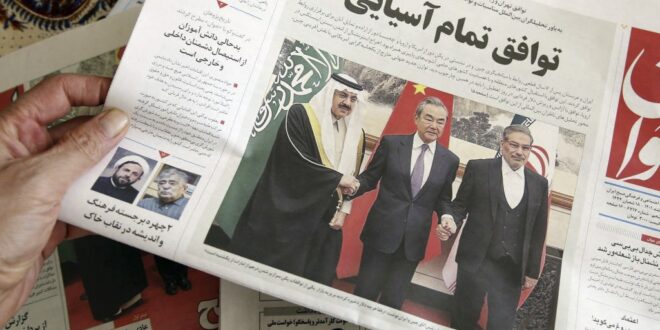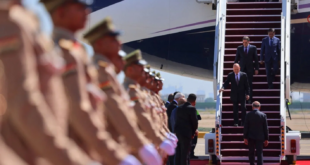Today, China is victorious by sponsoring the historic agreement between Saudi Arabia and Iran, while the US has a new president who comes to destroy agreements reached by his predecessor, and even brags about it during his election campaign and his presidency.” — Saeed Al-Mryti, Saudi political activist, Twitter, March 14, 2023.
“[N]o matter how hard analysts try to beautify the situation for US policy, what Saudi Arabia has done today is a direct and successful blow to the Biden administration and its policy in the Middle East.” — Jubran Al-Khoury, Lebanese political analyst, annahar.com, March 12, 2023.
It is thus no surprise that Iran and its terror proxies – Hamas, Palestinian Islamic Jihad and Hezbollah – are expressing profound satisfaction over the Saudi-Iranian agreement. In their eyes, the agreement is an indication of the growing weakness of the US and the failed policy of the Biden administration in the Middle East. Thanks to the US administration’s fragility, the Iranian-led axis of evil has been significantly emboldened as America’s erstwhile Arab allies are rushing towards the open arms of the mullahs in Tehran.
Many Arabs and Muslims are celebrating the Saudi-Iranian agreement to restore diplomatic relations as a devastating blow to the Biden Administration, a victory for Iran and China, and a sign of Washington’s failed policies in the Middle East.
According to these Arabs and Muslims, the Saudi-Iranian pact is the direct result of the Biden Administration’s antagonism towards America’s traditional Arab allies, especially Saudi Arabia, and the American policy of appeasement towards the mullahs in Iran.
Lebanese-born American scholar Walid Phares wrote that in the past two years he has been issuing warnings that the Biden administration’s dealings with the Arab allies “were neither at the required level nor with the necessary depth.”
According to Phares, the Obama Administration “went too far in its partnership with Iran and the Muslim Brotherhood, while turning its back on the Arab countries, with the aim of establishing partnerships with Islamists in the region.”
Phares pointed out that this policy of the Obama administration led to the first crisis of confidence between Washington and the Arab countries. The Trump Administration, however, he noted, “embarked on an unprecedented alliance with the Arabs to isolate Iran and defeat the Islamic State (ISIS).”
"The Arab-American alliance lasted four years, and Saudi Arabia and its partners committed themselves to the shared agenda on all fronts, starting with confronting the [Iranian-backed] Houthis [in Yemen] and supporting those who confronted Iran, in addition to uprooting Al-Qaeda and ISIS and, most importantly, delegitimizing radical Islam... However, the fluctuation in US foreign policy after the end of the Trump administration and the arrival of President Joe Biden's administration put the Saudis, and with them all the Arabs, in a difficult position. The Arabs continued with their commitment to the policy agreed upon with the Trump administration, but the administration of his successor turned against it. In 2021, the Arab coalition found itself headed towards war with Iran, while the Biden administration was going to make peace with Tehran!"Phares noted that the Biden Administration has continued the policy of the Obama Administration by ignoring the Arab coalition and the concerns of the Arab countries about the expansionist and terrorist dangers of the radicals in the Middle East. The Arabs, he added, also saw how the Biden Administration handed over Afghanistan to the Taliban “and were shocked to see the West scrambling towards the negotiating table with the Iranians, while ignoring the Arab countries and their national interests.”
Many Arabs have also taken to social media to praise the Chinese-brokered Saudi-Iranian agreement, hailing it as a major defeat for the policies of the Biden administration and a victory for China.
“China is coming with force and has defeated America politically,” read a comment posted by Saudi political activist Saeed Al-Mryti.
"China extracted full Arab recognition against America's policies. Today, China is victorious by sponsoring the historic agreement between Saudi Arabia and Iran, while the US has a new president who comes to destroy agreements reached by his predecessor, and even brags about it during his election campaign and his presidency."Another Arab, Ahmed Al-Fifi, wrote on Twitter:
"Two earthquakes, unprecedented for nearly 70 years, have hit Washington, and their center is in Riyadh! The first occurred in 1986 when Saudi Arabia bought long-range strategic missiles from China. The second was when Saudi Arabia worked to restore its relationship with Iran under Chinese auspices."Prominent Iraqi author Iyad Al-Dalimi wrote that by choosing China as the sponsor of the agreement, the Saudis aimed to place the Biden administration in an embarrassing situation. The Saudi-Iranian agreement, Al-Dalimi stated, “came in response to Biden ignoring Saudi Arabia and the apathy that afflicted this relationship since he assumed power more than two years ago.”
Commenting on the Saudi-Iranian agreement, Lebanese political analyst Jubran Al-Khoury wrote that “no matter how hard analysts try to beautify the situation for US policy, what Saudi Arabia has done today is a direct and successful blow to the Biden administration and its policy in the Middle East.”
Al-Khoury pointed out that the Biden administration tried to “escape” from the Middle East to confront China in its home in the Far East.
"Two years after this American decision, Saudi Arabia allowed China to enter directly into Middle East politics from the wide door... Since 2021, Saudi Arabia's policy has changed due to a change in America's policy, and Saudi Arabia has taken several measures, which include launching negotiations with Iran, expanding trade relations with China despite the declared trade war between the US and China, and developing Saudi relations with Russia...
"The Biden administration has become keenly aware that the new policy of Saudi Arabia is no longer as flexible towards American requests as it was previously... Indeed, Saudi Arabia, with its current performance, may have forced America to reconsider its policy in the Middle East."The Palestinians, who are opposed to peace between Israel and the Arab countries, also see the Saudi-Iranian accord as a severe blow to both the US and Israel. The Palestinians are voicing optimism that the agreement will stop Saudi Arabia and other Arab countries from joining the Abraham Accords, a series of treaties normalizing diplomatic relations between Israel, the United Arab Emirates, Bahrain, Kosovo, Sudan and Morocco.
By turning its back on Saudi Arabia, the Biden Administration has empowered the Arabs who oppose peace with Israel and destroyed any chance of expanding the Abraham Accords to include more Arab countries.
According to an editorial in the Palestinian newspaper Al-Quds:
"The Saudi-Iranian agreement dealt a strong blow not only to Israel, but also to America and many European countries that are imposing a blockade on Iran and stirring unrest within it... Likewise, the agreement will be a prelude to the Arab world's exit from American control and hegemony, and support the international trend against America in order to end its domination of the world through unipolarity. This agreement will unite the Arabic and Islamic [worlds]; it will also end Israeli hopes of getting Saudi Arabia to join the Abraham Accords."It is thus no surprise that Iran and its terror proxies – Hamas, Palestinian Islamic Jihad and Hezbollah – are expressing profound satisfaction over the Saudi-Iranian agreement. In their eyes, the agreement is an indication of the growing weakness of the US and the failed policy of the Biden administration in the Middle East. Thanks to the US administration’s fragility, the Iranian-led axis of evil has been significantly emboldened as America’s erstwhile Arab allies are rushing towards the open arms of the mullahs in Tehran.
 Eurasia Press & News
Eurasia Press & News




